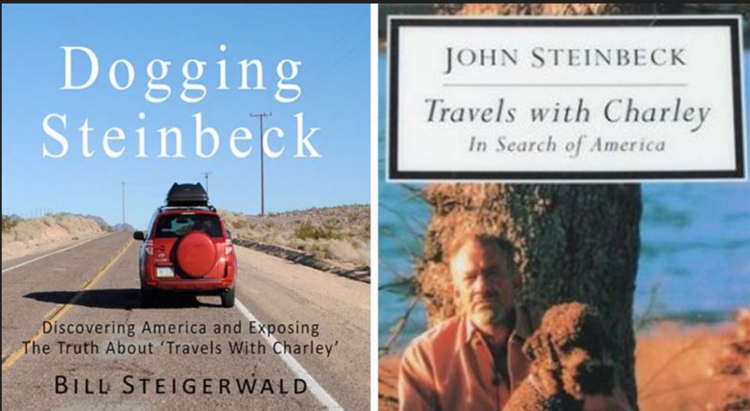
John Steinbeck’s "Travels With Charley", Fact-Checked
04/04/2011
John Steinbeck’s 1962 year travel memoir of a Wanderjahraround America, Travels With Charley, has been relentlessly fact-checked by Bill Steigerwald in Reason Magazine, (not online yet, see In Dubious Travels, by Jesse Walker). The New York Times has more: A Reality Check for Steinbeck and Charley, By Charles McGrath, April 3, 2011.
"Almost from the beginning, though, a few readers pointed out that many of the conversations in the book had a stagey, wooden quality, not unlike the dialogue in Steinbeck’s fiction. Early on in the book, for example, Steinbeck has a New England farmer talking in folksy terms about Nikita S. Khrushchev’s shoe-pounding (or -brandishing, depending on whom you ask) speech at the United Nations weeks before Khrushchev actually visited the United Nations. A particularly unlikely encounter occurs at a campsite near Alice, N.D., where a Shakespearean actor, mistaking Steinbeck for a fellow thespian, greets him with a sweeping bow, saying, "I see you are of the profession," and then proceeds to talk about John Gielgud. "
Steigerwald undertook a similar journey last year, calling it "Travels Without Charley," and blogging while he did it. I realize that a lot of Steinbeck’s book is fictional, especially the dialogue, but I am tempted to agree with some of the people who say that it’s not that important — Steinbeck was a novelist, not a reporter. I quoted Travels With Charley in a couple of blog posts, based on his story of encountering some French-Canadian migrant workers in Maine. They really were temporary workers, since they had their own farms in Canada. Steinbeck wrote:
"It occurs to me that, just as the Carthaginians hired mercenaries to do their fighting for them, we Americans bring in mercenaries to do our hard and humble work. I hope we may not be overwhelmed one day by peoples not too proud or too lazy or too soft to bend to the earth and pick up the things we eat."John Steinbeck:"I Hope We May Not Be Overwhelmed One Day"
"I've known quite a few migrant people over the years-Okies and Mexican wetbacks, and the Negroes who move into New Jersey and Long Island. And wherever I've seen them there has always been a contractor in the background to smooth the way for them for a consideration. Years ago the farmers tried to draw more labor than they needed so that they could lower wages. This seems to be no longer true, for government agencies channel only as many laborers as are needed, and some kind of minimum wage is maintained.
More John Steinbeck — Immigrant Labor In 1959
And see also Steinbeck’s myth of the Okies, by Keith Windschuttle, New Criterion, June 2002.
